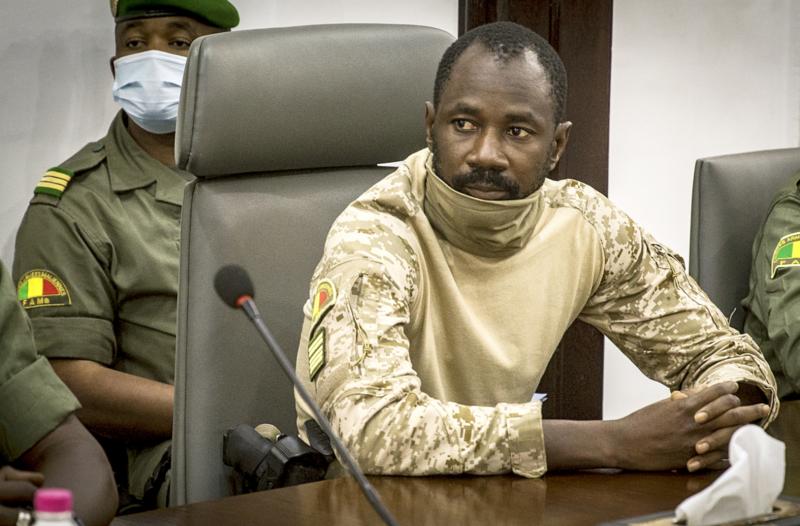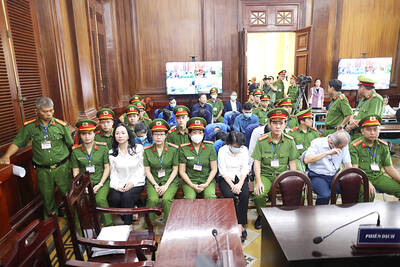West African mediators were to be allowed to meet with Mali’s detained president and prime minister yesterday, a source close to the discussions said, two days after the transitional leaders were stripped of their powers by the country’s military.
The detention on Monday of Malian President Bah Ndaw and Malian Prime Minister Moctar Ouane, tasked with steering the return to civilian rule after a coup in August last year, triggered widespread international condemnation and the threat of sanctions.
The UN Security Council was to hold an emergency meeting later yesterday at the request of France and others, with French President Emmanuel Macron likening the recent events to a second coup.

Photo: AP
A mediation team from the Economic Community of West African States (ECOWAS) on Tuesday arrived in the Malian capital, Bamako, and has been “given the green light” by Malian Vice President Assimi Goita to meet with Ndaw and Ouane, a source close to the talks told reporters.
“We are here to help our Malian brothers find a solution to the crisis, but it is clear that ECOWAS could quickly announce sanctions at a future summit,” said a member of the delegation, which is headed by former Nigerian president Goodluck Jonathan.
Macron, whose country has committed more than 5,000 troops to Mali’s fight against jihadism in the Sahel, condemned the arrest of Ndaw and Ouane as a “coup d’etat in an unacceptable coup d’etat.”
“We are ready in the coming hours to take targeted sanctions” against those responsible, he said after a EU summit.
On Monday, the UN, the African Union, ECOWAS, the EU and the US issued a joint statement, attacking the detention and demanding that the pair be released.
That demand was echoed on Tuesday by the UK and Germany.
A senior Malian military official, speaking on condition of anonymity, said that Ndaw and Ouane had been taken to the Kati military camp near Bamako and “are fine.”
“They spent the night in good conditions. The president saw his doctor,” the source said.
A member of Goita’s team said that during the talks with the ECOWAS mediators, they had “explained their reasons” for pushing the two men out and insisted that elections would be held next year.
More talks would be held with the ECOWAS delegation, they said.
Military officers in August last year ousted then-Malian president Ibrahim Boubacar Keita after weeks of demonstrations over perceived government corruption and his handling of the jihadist insurgency.
ECOWAS, a 15-nation regional bloc, threatened sanctions, prompting the junta to hand power to a caretaker government that pledged to reform the constitution.
Ndaw and Ouane had been heading that interim government with the declared aim of restoring full civilian rule within 18 months.
However, there had been signs of discontent among the public, with the opposition M5 movement demanding a “more legitimate” body.
On May 14, the government said that it would appoint a new “broad-based” Cabinet.
Designed to respond to growing criticism, the reshuffle saw the military keep the strategic portfolios it controlled during the previous administration.
Two other coup leaders — former Malian minister of defense Sadio Camara and former Malian minister of security Modibo Kone — were replaced, prompting officers to detain the president and prime minister.
Goita accused Ndaw and Ouane of failing to consult him on the reshuffle.
“This kind of step testifies to the clear desire of the transitional president and prime minister to seek to breach the transitional charter,” Goita said, describing this as a “demonstrable intent to sabotage the transition.”
The transitional charter, a document largely drawn up by colonels, sets down principles for underpinning Mali’s return to civilian rule.
“The scheduled elections will be held in 2022,” Goita said.

Republican US lawmakers on Friday criticized US President Joe Biden’s administration after sanctioned Chinese telecoms equipment giant Huawei unveiled a laptop this week powered by an Intel artificial intelligence (AI) chip. The US placed Huawei on a trade restriction list in 2019 for contravening Iran sanctions, part of a broader effort to hobble Beijing’s technological advances. Placement on the list means the company’s suppliers have to seek a special, difficult-to-obtain license before shipping to it. One such license, issued by then-US president Donald Trump’s administration, has allowed Intel to ship central processors to Huawei for use in laptops since 2020. China hardliners

A top Vietnamese property tycoon was on Thursday sentenced to death in one of the biggest corruption cases in history, with an estimated US$27 billion in damages. A panel of three hand-picked jurors and two judges rejected all defense arguments by Truong My Lan, chair of major developer Van Thinh Phat, who was found guilty of swindling cash from Saigon Commercial Bank (SCB) over a decade. “The defendant’s actions ... eroded people’s trust in the leadership of the [Communist] Party and state,” read the verdict at the trial in Ho Chi Minh City. After the five-week trial, 85 others were also sentenced on

DISADVANTAGE: Erin O’Toole, who led the Conservatives during the election campaign in 2021, estimated that the interference cost his party as many as nine legislative seats Canada’s domestic spy agency on Monday concluded that China interfered in the past two elections, an official probe heard, the firmest evidence so far of suspected Chinese meddling in Canadian politics. Canadian Prime Minister Justin Trudeau’s Liberal Party won both the elections, held in 2019 and 2021. Under pressure from opposition lawmakers unhappy about media reports on China’s possible role, Trudeau set up a commission into foreign interference. The commission was shown a slide on Monday containing an extract of a briefing in February last year from the Canadian Security Intelligence Service (CSIS). “We know that the PRC [People’s Republic of China] clandestinely

‘DELUSIONAL’: Targeting the families of Hamas’ leaders would not push the group to change its position or to give up its demands for Palestinians, Ismail Haniyeh said Israeli aircraft on Wednesday killed three sons of Hamas’ top political leader in the Gaza Strip, striking high-stakes targets at a time when Israel is holding delicate ceasefire negotiations with the militant group. Hamas said four of the leader’s grandchildren were also killed. Ismail Haniyeh’s sons are among the highest-profile figures to be killed in the war so far. Israel said they were Hamas operatives, and Haniyeh accused Israel of acting in “the spirit of revenge and murder.” The deaths threatened to strain the internationally mediated ceasefire talks, which appeared to gain steam in recent days even as the sides remain far